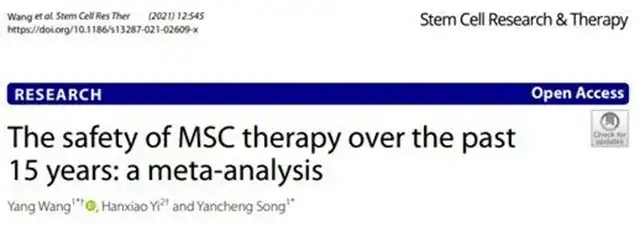Is it safe to infuse mesenchymal stem cells?
- Normal Liver Cells Found to Promote Cancer Metastasis to the Liver
- Nearly 80% Complete Remission: Breakthrough in ADC Anti-Tumor Treatment
- Vaccination Against Common Diseases May Prevent Dementia!
- New Alzheimer’s Disease (AD) Diagnosis and Staging Criteria
- Breakthrough in Alzheimer’s Disease: New Nasal Spray Halts Cognitive Decline by Targeting Toxic Protein
- Can the Tap Water at the Paris Olympics be Drunk Directly?
Is it safe to infuse mesenchymal stem cells?
- Should China be held legally responsible for the US’s $18 trillion COVID losses?
- CT Radiation Exposure Linked to Blood Cancer in Children and Adolescents
- FDA has mandated a top-level black box warning for all marketed CAR-T therapies
- Can people with high blood pressure eat peanuts?
- What is the difference between dopamine and dobutamine?
- How long can the patient live after heart stent surgery?
Is it safe to infuse mesenchymal stem cells?
Safety of Mesenchymal Stem Cell Infusions: Recent Clinical Studies Provide Reassurance.
Subtitle: Clinical Trials and Meta-Analysis Confirm the Safety and Efficacy of Mesenchymal Stem Cell Therapy
Nobel laureate Professor Thomas C. Sudhof has emphasized the potential of controlling diseases through the use of mesenchymal stem cells (MSCs), stating that these cells offer a promising therapeutic approach in situations where traditional medical treatments fall short. With advancing technology, the safety of MSCs has seen significant improvement, leading to their increased application in the treatment of various clinical conditions, showcasing positive therapeutic outcomes.
As we delve deeper into both basic and clinical research on MSCs, it is anticipated that these cells will offer novel therapeutic strategies for addressing stubborn medical challenges. However, a lingering question remains: Is the infusion of stem cells truly safe?
01. Clinical Trials: Assessing the Safety and Efficacy of Stem Cell Infusions
A comprehensive review published in the journal “Eclinical Medicine” summarizes clinical randomized trials conducted between 2012 and 2019, focusing on the safety of mesenchymal stem cells.
The study, which expanded on previous research, analyzed adverse reactions reported in various clinical settings, including cardiovascular, neurological, renal, hepatic, respiratory, endocrine, hematologic/malignant, and immunodeficiency or inflammatory diseases.

The results indicated that the risk of fever in the MSC group was significantly higher compared to the control group, albeit lower than previous findings from pre-2012 studies. Notably, there was no significant increase in the risk of thrombotic events in the MSC group compared to the control group. Additionally, the risk of death was markedly lower in the MSC group. Subgroup analyses revealed increased acute transfusion toxicity in neurologic and immune/inflammatory populations, especially with allogeneic bone marrow, umbilical cord, or fresh MSC treatment and the use of non-human-derived (or unclear) MSC culture media. In contrast, patients with cardiovascular diseases, neurological disorders, and liver diseases who underwent MSC treatment showed a significant reduction in the risk of death.
While these findings provide important insights into the safety of MSC therapy, further research with larger and more diverse samples is needed to validate these results. Ongoing studies should explore the safety of MSC treatment in different populations and treatment protocols, intensifying the monitoring and reporting of adverse events.
In summary, the analysis demonstrated that MSC therapy, when compared to the control group, showed no significant association with fever, infection, malignant tumor development, or thrombosis. The reassurance provided by these reviews adds an extra layer of confidence for researchers, clinicians, regulators, patients, and their families regarding the safety and reliability of MSC therapy.
Furthermore, as the understanding of MSCs deepens, considering their diverse sources (such as embryonic or induced pluripotent stem cells) and ongoing research on next-generation MSCs, continuous monitoring and reporting of adverse events associated with MSC therapy are crucial for a more comprehensive understanding of its safety and potential risks.
02. 62 Clinical Studies Confirm the Safety of Mesenchymal Stem Cell Infusions
A recent meta-analysis, published in “Stem Cell Research & Therapy,” conducted a retrospective review of 15 years of clinical trials involving mesenchymal stem cell therapy. The analysis aimed to evaluate the safety of MSC treatment by assessing adverse events associated with its clinical application.

The study included 62 clinical trials conducted over 15 years, involving 3546 patients. Among these trials, only two were prospective non-randomized trials, with the rest being randomized controlled trials spanning clinical trial phases 1/2 to 3. The majority of trials were conducted in Asia, followed by North America and Europe.
The primary sources of mesenchymal stem cells in these studies were bone marrow, adipose tissue, and umbilical cord. The injected cell doses varied from 4×10^7 to 1.2×10^9 cells, and follow-up durations ranged from 6 months to 2 years.
The results demonstrated that mesenchymal stem cell administration did not show a close association with major adverse events, including vascular diseases, urticaria/dermatitis, central nervous system disorders, diarrhea, death, or infections. The analysis suggested a potential transient fever within 48 hours post-treatment and adverse events at the injection site. Mild adverse events, such as insomnia, constipation, and fatigue, were associated with mesenchymal stem cells, while no correlation was found with anemia, metabolism and nutrition disorders, nausea, seizures, or vomiting.
In conclusion, multiple completed clinical studies provide robust evidence supporting the clinical safety of mesenchymal stem cell therapy. Although administration may be correlated with transient fever and injection site adverse events, no significant associations were observed with other adverse reactions.
Overall Summary:
Advancements in technology have significantly enhanced the safety of stem cells. Research findings indicate that, under certain conditions, the induction and differentiation of stem cells can be effectively controlled to mitigate the risk of tumor formation. Additionally, the use of immunosuppressants can reduce immune rejection following stem cell transplantation.
As we continue to deepen our understanding through both basic and clinical research on mesenchymal stem cells, it is expected that these cells will provide new therapeutic strategies for addressing a variety of persistent medical challenges.
Is it safe to infuse mesenchymal stem cells?
(sourceinternet5AfjRkhG3QlI2nIHsRwNXg, reference only)
Disclaimer of medicaltrend.org
Important Note: The information provided is for informational purposes only and should not be considered as medical advice.



